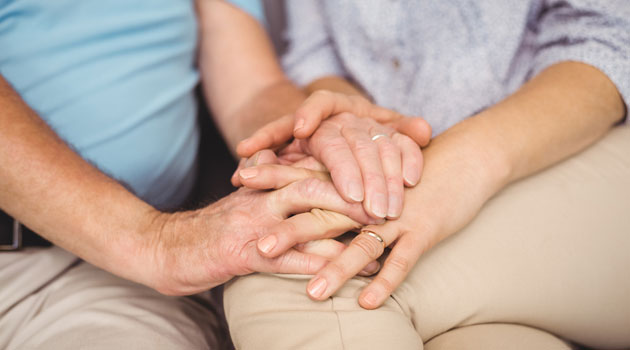Good Morning Friday 19th April 2024

STIs and women over 50

Why are sexually transmitted infections becoming more and more common among over 50s? With figures doubling in the past decade, it's clear we need to talk about safe sex. So what are STI symptoms in women and how do you get treatment? With such worries as discussing sexually transmitted infections with health professionals as well as partners, we think it's time to start breaking down the stigma and prioritising awareness.
Get more health advice delivered straight to your inbox...
What are STIs?
Sexually transmitted infections are passed from person to person through unprotected sex or contact with genitals - you do not need to have penetrative sex as some STIs spread through skin-to-skin contact. The most common STIs are chlamydia and genital warts.
"There's a reluctance to talk about such things. Let's get this taboo subject out into the open. Use condoms. Don't be embarrassed to ask if he's got a condom at the ready. If he hasn't, produce your own and make sure it's used - and used for the entire time! It's for his protection as well as yours."
Sexual health and women over 50
According to recent studies by the Health Protection Agency (now part of Public Health England) and the FPA, the number of STI cases among over 50s are rising dramatically, and have been for a while. In a study published by the StudentBMJ, co-author Rachel von Simson writes: “A cross sectional study showed that more than 80 percent of 50-90 year olds are sexually active, with cases of many common sexually transmitted infections more than doubling in this age group in the past 10 years”.
One possible explanation is that commonly, awareness campaigns are directed towards the under 25s and may have been missed by this age group resulting in a lack of education about STIs and safe sex. Another explanation, is the increase in divorce rates and the rise of dating sites and social media affecting how over 50s meet new partners. It is also worth considering that changing lifestyles and better health in older people could be a factor. According to sexual health charities, people in this age group are more likely to think that STIs are not relevant to them anymore, in a similar fashion to pregnancy concerns. It is possible that women over 50 are less likely to use condoms because the risk of pregnancy is no longer a factor after the menopause.
Regardless of why STIs are flourishing within this age group, it is important to note that such investigations are typically (though not exclusively) based on numbers visiting sexual health clinics; the increased number could also be because of an improvement in attitudes towards sexual health - and in particular, the stigma of visiting sexual health clinics.
"STIs are becoming increasingly common in post-menopausal women as we are not worried about pregnancy."
"I feel people are not aware of the risk of having unprotected sex after the menopause. The greatest increase in sexually transmitted disease is in the 50+. You are talking to your children about the risk, but don't necessarily think it applies to you."
The most common STI symptoms in women
The most common STI in the UK is chlamydia, which is often symptom free. This is why it is important to have regular check-ups with your health professional if you have unprotected sex. Another common infection, gonorrhoea, also presents symptom free in many. For those who do experience symptoms, the following are indicators of chlamydia and gonorrhoea:
- Burning when urinating
- Vaginal discharge
- Bleeding during/after sex, or spontaneous bleeding
- Pain in the lower abdomen
It is important to remember that chlamydia and gonorrhoea are not limited to vaginal infections, but it is also possible to get the infection in the rectum, throat and eyes.
Worryingly, we are starting to see more and more cases of the previously less common STI, syphilis, which is also a bacterial infection. Syphilis presents itself as sores on the genitals or around the mouth and is associated with the following symptoms:
- Flu or cold-like symptoms
- Rashes
- Hair loss
Left untreated, syphilis can have serious consequences, including but not limited to, blindness and heart problems.
Another type of very common STI is genital warts, caused by human papilloma virus (HPV). Presenting as bumps/lumps or warts, this infection usually causes itchiness, redness or sometimes, bleeding.
Genital herpes is the same virus as the one that produces common cold sores, but it presents on the genitals. Genital herpes, whilst not curable, can be managed with certain antiviral medications and is only active from time to time, being mostly dormant.
Pubic lice and scabies (tiny mites) are two forms of STIs that you can catch from genital contact, or by coming into contact with exposed bedding or clothes. Both result in itching and can be treated with specially prescribed creams or shampoos.
HIV is spread from unprotected sex as well as through blood contact. The symptoms of the early stages of HIV are usually flu-like such as a sore throat, cough or rash, however it is worth bearing in mind that the transmission of the HIV infection may take months from exposure. If you are concerned at all, many clinics offer a simple blood test done on the day.
As the infection attacks the immune system and its ability to cope, contracting HIV does mean you are always at much higher risk of other illness. There is currently no cure for HIV, however, most are able to live relatively healthy lives because of today's treatment options.
Most importantly, whether or not you are experiencing any of the above symptoms, get checked out regularly if you are having unprotected sex. Often, symptoms don't present and you might not know you have an STI. If you would like more information about sexually transmitted infections, please visit the NHS's helpful guides on chlamydia, gonorrhoea, genital warts, syphilis, HIV, genital herpes, pubic lice and scabies.
If you had unprotected sex or you think you might have an STI
Book an appointment with your local surgery or your nearest GUM (genitourinary medicine) clinic. Occasionally, STIs are misdiagnosed as UTIs (urinary tract infections) and vice versa, so if your treatment does not work, you need to go back to see your health professional.
"I had a UTI which was misdiagnosed as an STI after my third child was born. You or your partner could have been infected before you and he met. He needs to get checked and if necessary treated because if he has it then he'll simply re-infect you."
If you need more information about STIs and how to get tested, please see the NHS guide on visiting STI clinics.
What to ask your health professional
When you visit your health professional, there are a few questions you need to make sure that you ask/get the answers to:
- Which STI do I have?
- What is the treatment?
- Who should I tell and can you help me?
- Do I need to book a follow-up appointment?
- How can I protect myself in the future?
If you feel like you've missed something or have further questions, contact your GP or the STI clinic. Being diagnosed with an STI is common and the health professional will not be shocked or find any of your questions silly - just keep asking questions until you feel that you understand and know what needs to happen. Remember, they know that this is a stressful situation for you and will try to support you as best they can.
"I'm a bit worried I didn't pay properly attention to what my GP said. All sorts was going through my head. I feel very stupid for not having asked at the time."
"I remember being asked if I knew the names of all the sexual partners I'd had within the previous week! I was horrified, there had only been my (ex) husband."
"Check with your doctor what you have and who you need to inform."

Talking to your partner
After you have seen your doctor and had a diagnosis confirmed, it is important you speak to your partner. If you have had unprotected sex with more than one partner recently, you must contact each individual to explain the situation. First and foremost, this is a health issue and sexual partners need to be tested and treated as soon as possible.
Unfortunately, STIs are not only a taboo subject, but there is still a lack of awareness, particularly amongst over 50s. There is sometimes also a negative association between STIs and infidelity, despite the fact that people may have been exposed to STIs such as chlamydia (which rarely has symptoms) prior to meeting their current partners. Of course, if you have been in a long term relationship during which you were tested previously and suddenly get diagnosed with a sexually transmitted infection, there could be an infidelity issue. That said, you and your partner are adults and need to discuss this giving each other the benefit of the doubt.
You may understandably be nervous bringing this up with your partner; if this is the case, remember that you are not alone in feeling this. Try to imagine how you would want your partner to tell you if he/she had been diagnosed with an STI and how you would feel. This might help you with how to approach the subject.
"You'll have to be brave and tell your partner."
"If you are close enough to be having sex with this man, then you should be brave enough to have this conversation with him."
"If I'm honest, I feel scared. I know it is something easily fixed with my prescription, but not only do I feel bad about myself, I'm worried about the talks that will come from this. Where did it come from and what if I've had this for a while - and not to mention talking about this with my ex-husband who might need to get checked."
"Be as up front and factual as you can, e.g: 'I have been diagnosed as having an STI. It came from one of my two sexual partners. You need to know this. I am telling my ex/partner too.' "
"For a start you need to tell your partner soon because if he's been infected then he will need treatment."

Contacting past sexual partners
Depending on how long your doctor says you are likely to have had the infection, you have to work out if you need to contact any previous sexual partners. You may be able to get help with this from your health professional.
"As a retired nurse who worked in an STD clinic please let me reassure that you are guaranteed complete confidentiality. We would ask of details of previous partners and if possible contact them. This would be done by phone or letter. The letter gives no details of yourself and the phone number is ex-directory so cannot be traced and only accessible by the person it has been given to."
Join a community of over 200,000 users on Gransnet today...
If you're embarrassed
If you feel embarrassed about having an STI - or having had one in the past - remember that it is only because of the taboo associated with the infections. Try to think of the historical perception of sex, women and genitals in particular. Female sexuality has long been associated with negative characteristics and stigma, and still is in some parts of the world. If you feel embarrassed, it is because of the way the subject of female genitalia has been shunned, not because you actually have anything to be embarrassed about.
"I'm really embarrassed to say this, I don't know why I didn't think about it when I went there in the first place. It's not like I haven't talked about this stuff with both my children!"
"Don't be embarrassed. The fastest growing group presenting at GUM clinics is middle-aged people. This is partly because the stigma of marriage break-ups has gone and partly because this group no longer worries about pregnancy as a consequence of unprotected sex."
"Don't be too embarrassed, it happens and many of us have been in your situation."
"Don't be embarrassed; you're not the first and won't be the last and my understanding is that STIs are on the increase with the older generation."
Treatment
Most STIs are easily and quickly treated with either a course of antibiotics or penicillin injections, or special prescription creams/shampoos. You doctor will prescribe you medication and you will often need to book a follow-up appointment to check that the treatment has worked. Some STIs, however, are only treatable/manageable rather than curable. Your health professional will talk you through which STI you have and what to expect in as much detail as you need.
It is very important to get STIs treated as soon as possible, as some have very serious complications if left untreated. If you have been diagnosed and started treatment for an STI, it is paramount that your partner is also tested and treated, regardless of whether he/she was the carrier. It is also important that you do not have any sexual contact while you are both in treatment.
"Avoid all sexual contact until you're STI free."
"First of all, don't worry too much. Most STIs are treatable fairly easily nowadays."
"Take the antibiotics and I'm sure it will clear up very soon. Good luck!"
Stay positive - you're not alone in this
Whether the STI you have contracted is curable or not, remember that you are not alone in this - many people have been in your situation and you too can deal with it and move on.
"No good comes from sticking your head in the sand. Yes, it feels more embarrassing when one is older, but just deal with it and move on."
"Try not to feel so bad, many people have had to face this problem."
"Unfortunately this is something that happens. Well done for making us aware of the risk."
"I can understand your shock, but really it's no big deal. Many of us have been there."
"No need to be embarrassed about your concerns. This forum will have loads of advice and experiences about all sorts of things. Hopefully you'll feel more confident on the way forward."
Disclaimer: The information on our health pages is only intended as an informal guide and should not be treated as a substitute for medical advice. Gransnet would urge you to consult your GP before you begin any diet if you're concerned about your weight, have existing health conditions and/or are taking medication.
Images: Shutterstock


